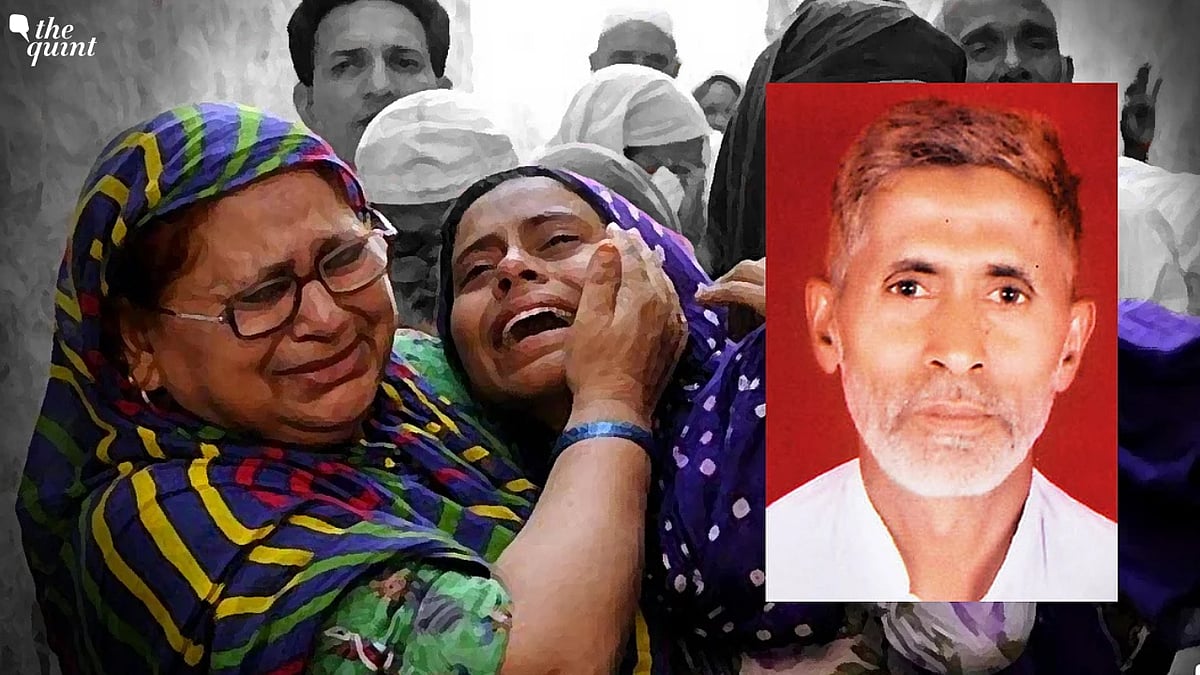
'No Firearms Used...’: Why UP Govt Seeks to Drop Case Against Akhlaq’s Killers
The UP govt also cited 'family's altered statements' while seeking to drop charges in Dadri lynching case.

advertisement
“Changing statements by Mohammad Akhlaq’s family…”
“No possession of firearms by the accused…”
“For the larger purpose of restoring communal harmony…”
These are some of the reasons cited by the Uttar Pradesh government as it seeks to drop all charges — including murder — against the accused in the Dadri lynching case, nearly a decade after the incident.
In the copy of the file submitted by the state in the upper sessions court, which The Quint accessed, the state has invoked Section 321 of the Criminal Procedure Code (CrPC), which allows a public prosecutor to withdraw from a prosecution case with the court’s consent.
On the night of 28 September 2015, fifty-two-year-old Akhlaq and his son Danish were dragged out of their home in Bisada, Dadri. A mob attacked them following an announcement at a temple that the family had consumed beef. Danish survived, but Akhlaq did not.
The Reasons Cited By the State
In its application, the state submitted 13 key points that detail the timeline of the investigation, the evidence proured, and the names of the accused.
Akhlaq’s lynching was preceded by allegations of storing and consuming cow meat. Referring to the forensic laboratory report, the application further stated:
“During the investigation, the investigating officer seized the alleged meat from the scene of the incident on 29 September 2015 and sent it to the Forensic Science Laboratory in Mathura for examination. The report, which came on 30 March 2017, confirmed that the alleged meat was bovine (cow) meat.”
The last four points shed light on the reasons deduced by the peosecution to back the application of withdrawal of charges against the accused:
That the statements of the abovementioned eyewitnesses—Smt. Asgari, Smt. Ikraman, Kumari Shaista, and Danish—include variations in the number of accused. Furthermore, both the complainant and the accused reside in the same village, Bisahda. Despite being from the same village, the complainant and other witnesses changed the number of accused in their statements.
That the incident is related to the consumption of cow meat, in which the police have shown the recovery of five sticks, rods, and bricks from the accused. This makes it clear that no firearm or sharp weapon was used in the incident.
That there is no evidence in the case diary indicating that there was any prior enmity, conflict, or hostility between the complainant and the accused.
That the Indian Constitution and the Indian judicial system provide equal protection to every citizen, whether they are a complainant, witness, or accused in any case. As Indian citizens, all parties are protected under the Constitution, and their rights are safeguarded by the Honourable Court.
"...It is requested that in the light of the above facts, considering the nature of evidence, for the larger purpose of restoring social harmony..." stating this, the state government sought order to withdraw the charges.
Some of the charges that the Uttar Pradesh government seeks to drop pertain to the following IPC sections: 302 (murder), 307 (attempt to murder), 147 (rioting), 148 (rioting armed with a deadly weapon), 149 (unlawful assembly), 323 (voluntarily causing hurt), and 504 (intentional insult with intent to provoke breach of the peace), among others.
Who Are the Accused?
In 2015, the Gautam Buddha Nagar police filed a chargesheet against 18 people, naming Vishal Rana, the son of a local Bharatiya Janata Party (BJP) leader, and his cousin Shivam as the main conspirators who allegedly led the mob to Akhlaq’s house and assaulted the family.
When the statements of Akhlaq’s wife, Ikraman, and his daughter, Shaista, were recorded on 13 October 2015, they did not name any accused. However, on 26 November 2015, Shaista named an additional six individuals as accused. Subsequently, on 5 December 2015, Akhlaq’s son, Danish, named three more individuals in his statement.
All the accused are from the same village.
- Access to all paywalled content on site
- Ad-free experience across The Quint
- Early previews of our Special Projects
Published: 17 Nov 2025,02:23 PM IST